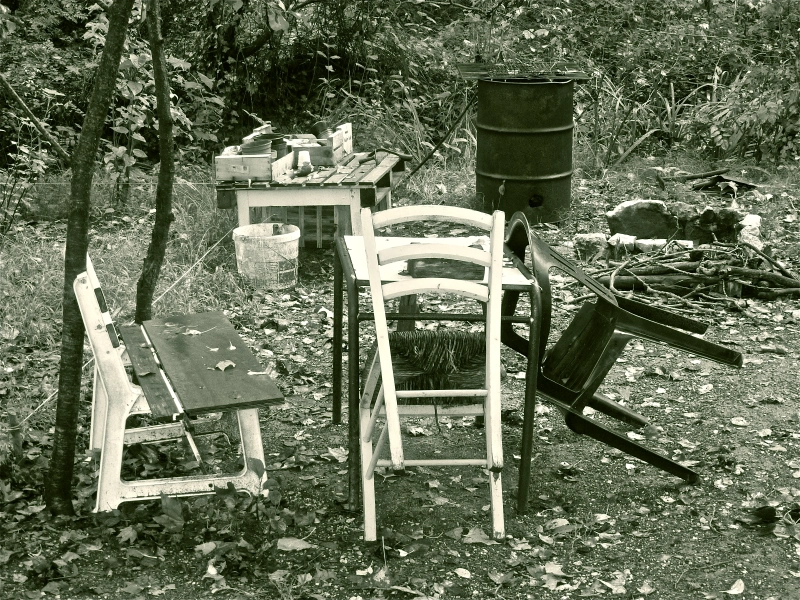
« Ah, le p’tit kawa » smiles Didier, « at least people are still taking time out for a quick coffee. » It’s just gone 2pm at the Nemrod on the RN76 in Bourges. The workers of small-town France have headed back to their respective shops, offices and factories, but on the way, they’ve stopped off for a quick coffee.
« No doubt about it » announces Didier as he clears the long line of coffee cups from the bar, « coffee is far and away our biggest earner and lunchtime is our busiest period. »
What about the rest of the time?
« Quite a few early morning punters, again for coffee and a few people popping in for a beer after work. These days though, people are drinking less. It’s cheaper to booze at home than prop up your local bar. I think the smoking ban was decisive though. When people couldn’t enjoy a cigarette with their drinks anymore, they stopped going to cafés and bars »
Didier laments the passing of old ways.
« I was brought up in St Quentin in Picardy. It was a very working class town at the time – a big textile industry. Before work, you’d meet your mates at the café for un p’tit jus before work. Come lunchtime, you’d be back down he café for an aperitif and then after work, you’d be back for a few beers with your mates. Café culture was, and still is very strong in the north of France. I think I’ve been going to cafés ever since I was a little kid in the late sixties, early seventies. Back then though, cafés were at the very heart of the community. Entire families would go to their local café. Births, marriages, deaths, good times, bad times, you’d always end up at the local café to celebrate or commiserate.
48-year-old Didier Rekut and his wife, Isabelle, (46) have been running the Nemrod in Bourges since 2006.
« I used be a delivery driver for a big textile factory in St Quentin, but as the mills started closing, it seemed like a good time to get out. I wasn’t quite sure what to do, but as I loved everything about café life, the wife and I decided to buy this place. »
Surely in these hard times, buying a bar is just a bit of a risk.
I think any business is risky business nowadays. Anyway, I’m happy with what I do, even if it means working twelve-hour days and having very little family life.
Does working long hours bring in a decent living? In good French tradition, Didier is more than evasive about what he earns.
« I make a reasonable living, bit I’d probably earn twice as much if I worked in a factory or an office. Saying that, trade isn’t too bad. Things have picked up a bit since the smoking ban. I lost around a third of my trade then, and not all the old smokers have come back. We’ve had to diversify. When I bought this place it was already a bar tabac and we also sold lottery tickets, but we’ve had to increase our press trade, and recently we got a betting licence, and we show horse racing live on TV, so we get a steady stream of turfistes (those who like to bet on horses), They like a few drinks while they study the form, all good for trade.
I get the feeling that running a bar is a vocation more than a profession?
« No doubt. You don’t do this for the money. I think being a cafetier requires very much the same vocational spirit as being a nurse or a teacher. We don’t just pull pints and serve coffee; we have a definite social and psychological role.
Is a psychology degree a prerequisite to run a bar?
« No » laughs Didier. « There is no formal training for this profession, though there are plenty of private organisations that offer courses in café management. When I say psychology, I mean that you have to be a good listener. Standing behind this bar, I get everybody’s life story. I know some punters like they were members of my own family. You know, when they announce good news, it’s easy to celebrate, but when a regular tells you that he’s dying of cancer … »
A sombre pause from Didier.
« In this job you’re everything, » he muses. « Chief cook and bottle washer, psychologist, philosopher, marriage guidance counsellor, walking encyclopaedia, and, ever since we installed the betting machines, I’ve had to become a bit of a racing tipster. Of course you can be everything to all men, but if you can’t pull a pint …”
Is this a profession with a future?
“Well I can certainly say that my kids won’t be taking over the family business. I think though, that there will always be a place for the café in France, mind you in the future we’re going to have to evolve, perhaps change our concept whilst maintaining our traditional role. Youngsters coming in will have to find new niche for the traditional café This isn’t a business for the faint hearted – hard work, long hours and always available for the clients. You have to like people, you have to live and breathe the whole café ethos. I suppose this would be my advice for anyone starting out in the trade. As for the punters, I’d say, support your local bistrot. If you never go to a café, the day you finally decide to do so, it might not be there anymore.”









